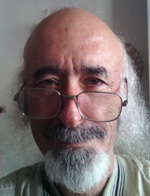
CHIAYI CITY, Taiwan — Readers nationwide are in for a treat with Chicago novelist Michael Zapata’s gorgeous, stunning The Lost Book of Adana Moreau. And readers of the San Diego Jewish World will be interested to know that the 40-year-old author is Jewish on his mother’s side and Ecuadorian on his father’s side.
I came across the author online a few months ago, during some recent literary detective work, when I discovered that Zapata’s book was scheduled for publication on February 4.
I haven’t read the book yet although I’ve ordered it online and hope it arrives in my overseas mailbox soon. For now, there are no formal book reviews in any national newspapers and that’s because the publisher in New York has asked reviewers not to write any until publication day when the novel will have its much-anticipated national debut.
“To answer your email, yes, my new novel does deal directly with the Jewish experience pre- and post-Russian Revolution, in Chicago during the Great Depression, and through the lens of an Israeli-American raised in Chicago decades later,” Zapata told me. “My mother’s family is Ashkenazi, originally from Lithuania, and my father’s family is from Ecuador.”
”My parents met in 1975 in Quito, Ecuador, when my mother was living there as a foreign exchange student studying Spanish. They met outside my mother’s university and, even though neither knew too much of the other’s language, they hit it off and were engaged three months later during Carnival in Santa Fe, the small Andean farming village where my father grew up. Their engagement and subsequent marriage in a courthouse in Quito was seen — for both of their families — as an act of rebellion.”
Like many young Jews in America these days, Zapata told me he is drawn more to Jewish culture that to the Jewish religion and is himself secular. His is novel explores these interlocking identities, too, he shared.
“As the whole known story goes, my paternal and maternal great-grandparents fled one of those unspeakable pogroms at the turn of the 20th century in the Russian Pale of Settlement and emigrated to the United States. With them, of course, came both rich religious and secular traditions, which, in part, replicated themselves as, yes, interlocking identities, but also occasional fissures in my own family in Chicago,” Zapata said.
”In my novel, I was interested in questioning those fissures, also viscerally and politically evident in the history of the Pale, the February and October Russian Revolutions, Israel, and Jewish immigration to the United States. Still, what binds us to thousands of years (and to each other) is a culture that advocates — and is anchored by — books and questioning, profound Saul Bellow or Cynthia Ozick-like lines of questioning of existence or endlessly mundane questioning such as the one thousand and one ways to best make a brisket. After all, questioning leads to possibility, to parallel worlds and survival.”
“My great-grandmother, who I knew for some time as a child, was fond of calling people, including myself, ‘luftmensch,’ a Yiddish term sometimes of insult, loosely meaning ‘someone with his head in the clouds,’ or more tenderly, for the novelist in me at least, as ‘someone who exists in a cloud of possibility’.”
By the way, Zapata’s grandfather in Ecuador is 100 now, and the author visits him there on occasional trips south.
When asked about his Ecuadorian roots from his dad and his Jewish roots from his mom, Zapata told me: “My sisters and I spent our childhoods navigating the construction of a new type of identity and reality, half Jewish, half first-generation Latino, a bifurcated reality, and a new type of language: Spanglish. We existed in a liminal space between continents and languages, a noisy, messy, lonely, and often beautiful space.”
Zapata is a graduate of the University of Iowa and lives in Chicago with his wife and two children.
His novel is being talked about now in literary circles as one of the most important books of 2020, according to publishing sources in New York.
“By the way,” Zapata told this reporter,” my novel does deal with the history of science fiction and the writing of science fiction, but the novel is not science fiction itself. I like to think of it as literary fiction. Generally, although I’m not a science fiction writer, I love the experiment and challenge of pulling together disparate genres (historical fiction, science fiction and autofiction) and traditions.”
*
Dan Bloom is a freelance writer, inveterate web surfer, and climate activist based in Chiayi City, Taiwan. He may be contacted via dan.bloom@sdjewishworld.com